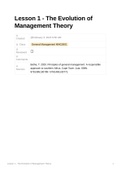Lesson 1 - The Evolution of
Management Theory
Created @February 3, 2023 9:50 AM
Class General Management MNG2601
Reviewed
Comments
Botha, T. 2020. Principles of general management: A responsible
Sources approach to southern Africa. Cape Town: Juta. ISBN:
.
Lesson 1 - The Evolution of Management Theory 1
, Scientific Approach to Management
The scientific approach to management involves a thorough study and testing of
different work methods to identify the best, most efficient way to complete a job
Frederick W Taylor (1856-1915)
Frederick W Taylor is labelled as the ‘father of scientific management’. According to
Taylor, scientific management is to find the ‘one best way’ to perform each task
4 Principles for Management
1. Develop a science for each element of the work - study each element, analyze it
and determine the one best way to perform the job
2. Scientifically select, train, teach and develop workers to help them reach their full
potential
3. Managers need to cooperate with employees to ensure that the scientific
principles are actually implemented
4. Divide the work and the responsibility equally between managers and workers
Frank Gilbreth (1868-1924) Lillian Gilbreth (1878-1972)
use of motion studies to simplify work
contributions to the employment of disabled workers and industrial psychology
they believed that the greatest waste in the world come form needless, ill-
directed and ineffective motions
Their motion studies broke each task or job into separate motions and then
eliminated those that were unnecessary or repetitive
Time studies worked by timing how long it took for a ‘first-class worker’ to
complete each part of his or her job. A standard time was established, allowing
for rest periods, and a worker’s pay would increase depending on whether the
worker exceeded or fell below that standard.
Lesson 1 - The Evolution of Management Theory 2




